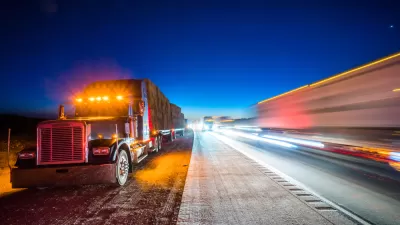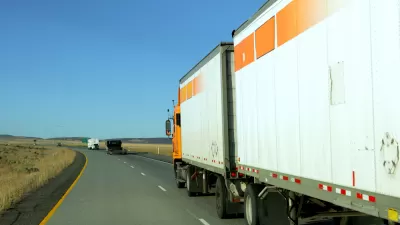A new report from the Congressional Budget Office places the spotlight on the trucking industry in terms of the social, health ,and environmental costs it imposes on society but does not pay for, i.e., externalities.
"A new report from the Congressional Budget Office (CBO) estimates that truck freight causes more than $58 to $129 billion annually in damages and social costs in the form of wear and tear on the roads, crashes, congestion and pollution – an amount well above and beyond what trucking companies currently pay in taxes," writes Joe Cortright of City Observatory, "a virtual think tank on urban issues funded by the John S. and James L. Knight Foundation."
Because they don’t pay the costs of these negative externalities, the firms that send goods by truck don’t have to consider them when deciding how and where to ship goods. This translates into a huge subsidy for the trucking industry of between 21 and 46 cents per mile.
Rail Comparison
The "unpriced external cost are around eight times higher than rail," writes David Austin, an analyst in CBO's Microeconomics Studies Division, and author of the CBO report.
"Railroads have much lower social costs, for two reasons: first, rail transport is much more energy efficient and less polluting per ton mile of travel; second, because railroads are built and maintained by their private owners, most of the cost of wear and tear is borne by private users, not the public," writes Cortright.
Four options to internalize the costs - from project summary
- "Add taxes based on the weight or distance of each shipment." For example, as noted in a recent post on road damage caused by heavy vs. light trucks, the Oregon Department of Transportation's "Motor Carrier Transportation Division already charges 'all commercial trucks and buses weighing more than 26,000 pounds' a weight-mile tax [PDF]."
- "Increase the existing tax on diesel fuel." The federal tax, 24.4 cents per gallon, like the 18.4 cents gasoline tax, was last increased in 1993.
Additional reasons to increase diesel tax:
According to the Energy Information Administration, "about 19.64 pounds of carbon dioxide (CO2) are produced from burning a gallon of gasoline that does not contain ethanol. About 22.38 pounds of CO2 are produced by burning a gallon of diesel fuel."
According to the National Association of Convenience Stores, "U.S. gasoline demand has decreased since peaking in 2007, demand for diesel fuel has remained strong. U.S. clean diesel vehicle sales increased 25.6% in 2012, almost double the overall auto market's increase."
- "Implement a tax on the transport of shipping containers."
- "Increase the existing tax on truck tires."
It should be noted, though, that the American Trucking Associations has been a strong supported of increasing the fuel tax, as noted by Ashley Halsey III in the The Washington Post last February.
FULL STORY: The real welfare Cadillacs have 18 wheels

Planetizen Federal Action Tracker
A weekly monitor of how Trump’s orders and actions are impacting planners and planning in America.

Map: Where Senate Republicans Want to Sell Your Public Lands
For public land advocates, the Senate Republicans’ proposal to sell millions of acres of public land in the West is “the biggest fight of their careers.”

Restaurant Patios Were a Pandemic Win — Why Were They so Hard to Keep?
Social distancing requirements and changes in travel patterns prompted cities to pilot new uses for street and sidewalk space. Then it got complicated.

Platform Pilsner: Vancouver Transit Agency Releases... a Beer?
TransLink will receive a portion of every sale of the four-pack.

Toronto Weighs Cheaper Transit, Parking Hikes for Major Events
Special event rates would take effect during large festivals, sports games and concerts to ‘discourage driving, manage congestion and free up space for transit.”

Berlin to Consider Car-Free Zone Larger Than Manhattan
The area bound by the 22-mile Ringbahn would still allow 12 uses of a private automobile per year per person, and several other exemptions.
Urban Design for Planners 1: Software Tools
This six-course series explores essential urban design concepts using open source software and equips planners with the tools they need to participate fully in the urban design process.
Planning for Universal Design
Learn the tools for implementing Universal Design in planning regulations.
Heyer Gruel & Associates PA
JM Goldson LLC
Custer County Colorado
City of Camden Redevelopment Agency
City of Astoria
Transportation Research & Education Center (TREC) at Portland State University
Camden Redevelopment Agency
City of Claremont
Municipality of Princeton (NJ)





























